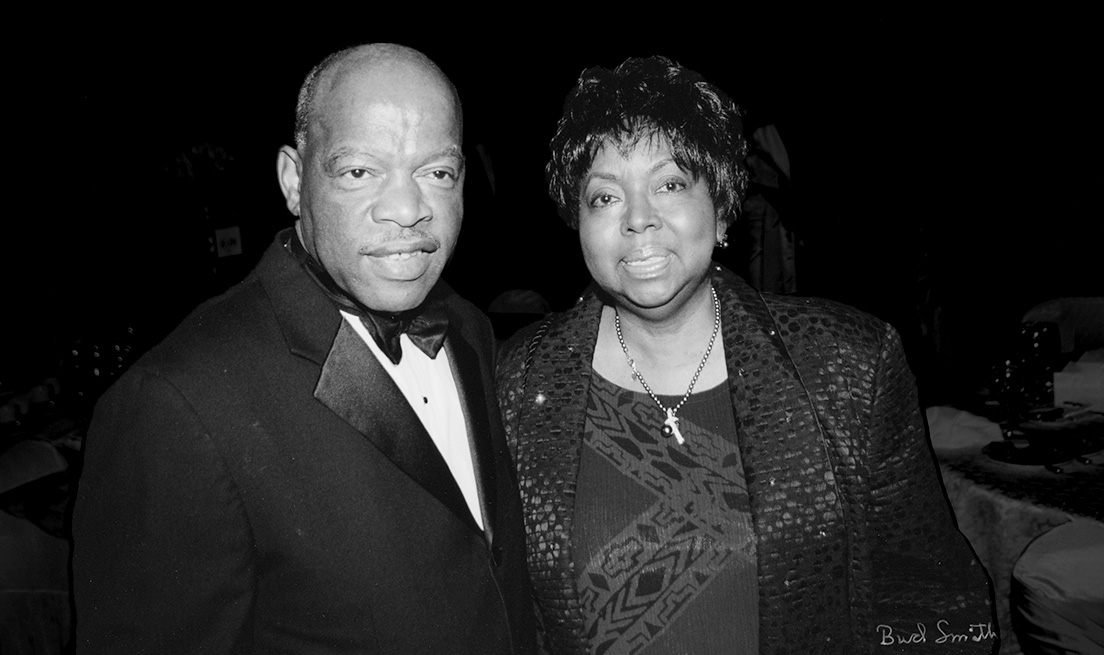
The Lewis
Legacy
Often called “one of the most courageous persons the Civil Rights Movement ever produced,” Congressman John Lewis dedicated his life to protecting human rights, securing civil liberties, and building what he called “The Beloved Community” in America. His dedication to the highest ethical standards and moral principles and his authenticity won him the admiration and respect of his colleagues on both sides of the aisle in the Congress and beyond.
Meet Congressman
John Robert Lewis
Activist · Politician · Husband · Father · American

The Conscience of the U.S. Congress — #1 New York Times Best-selling Author
Often called “one of the most courageous persons the Civil Rights Movement ever produced,” Congressman John Lewis dedicated his life to protecting human rights, securing civil liberties, and building what he called “The Beloved Community” in America. His dedication to the highest ethical standards and moral principles won him the admiration of many of his colleagues on both sides of the aisle in the United States Congress.
He was born the son of sharecroppers on February 21, 1940, outside of Troy, Alabama. He grew up on his family’s farm and attended segregated public schools in Pike County, Alabama. As a young boy, he was inspired by the activism surrounding the Montgomery Bus Boycott and the words of the Rev. Martin Luther King Jr., which he heard on radio broadcasts. In those pivotal moments, he made a decision to become a part of the Civil Rights Movement. He remained at the vanguard of progressive social movements and the human rights struggle in the United States.
As a student at Fisk University, Congressman John Lewis organized sit-in demonstrations at segregated lunch counters in Nashville, Tennessee. In 1961, he volunteered to participate in the Freedom Rides, which challenged segregation at interstate bus terminals across the South. Lewis risked his life on those Rides many times by simply sitting in seats reserved for white patrons. He was also beaten severely by angry mobs and arrested by police for challenging the injustice of Jim Crow segregation in the South.
During the height of the Movement, from 1963 to 1966, Lewis was named Chairman of the Student Nonviolent Coordinating Committee (SNCC), which he helped form. SNCC was largely responsible for organizing student activism in the Movement, including sit-ins and other activities.
While still a young man, Congressman John Lewis became a nationally recognized leader. By 1963, he was dubbed one of the Big Six leaders of the Civil Rights Movement. At the age of 23, he was an architect and a keynote speaker at the historic March on Washington in August 1963.
In 1964, Congressman John Lewis coordinated SNCC efforts to organize voter registration drives and community action programs during the Mississippi Freedom Summer. The following year, Lewis helped spearhead one of the most seminal moments of the Civil Rights Movement. Hosea Williams, another notable Civil Rights leader, and Congressman John Lewis led over 600 peaceful, orderly protestors across the Edmund Pettus Bridge in Selma, Alabama on March 7, 1965. They intended to march from Selma to Montgomery to demonstrate the need for voting rights in the state. The marchers were attacked by Alabama state troopers in a brutal confrontation that became known as “Bloody Sunday.” News broadcasts and photographs revealing the senseless cruelty of the segregated South helped hasten the passage of the Voting Rights Act of 1965.
Despite more than 40 arrests, physical attacks and serious injuries, Congressman John Lewis remained a devoted advocate of the philosophy of nonviolence. After leaving SNCC in 1966, he continued his commitment to the Civil Rights Movement as Associate Director of the Field Foundation and his participation in the Southern Regional Council’s voter registration programs. Lewis went on to become the Director of the Voter Education Project (VEP). Under his leadership, the VEP transformed the nation’s political climate by adding nearly four million minorities to the voter rolls.
Despite more than 40 arrests, physical attacks and serious injuries, Congressman John Lewis remained a devoted advocate of the philosophy of nonviolence.
In 1977, Congressman John Lewis was appointed by President Jimmy Carter to direct more than 250,000 volunteers of ACTION, the federal volunteer agency.
In 1981, he was elected to the Atlanta City Council. While serving on the Council, he was an advocate for ethics in government and neighborhood preservation. He was elected to Congress in November 1986 and served as U.S. Representative of Georgia’s Fifth Congressional District. He was Senior Chief Deputy Whip for the Democratic Party in leadership in the House, a member of the House Ways & Means Committee, and Chairman of its Subcommittee on Oversight.
Congressman John Lewis received a B.A. in Religion and Philosophy from Fisk University, and was a graduate of the American Baptist Theological Seminary, both in Nashville, Tennessee. He was initiated into Phi Beta Sigma, Inc. in 1975 and is a recipient of its highest honor, the Distinguished Service Chapter. He was awarded over 50 honorary degrees from prestigious colleges and universities throughout the United States, including Harvard University, Brown University, the University of Pennsylvania, Princeton University, Duke University, Morehouse College, Clark-Atlanta University, Howard University, Brandeis University, Columbia University, Fisk University, and Troy State University.
Congressman John Lewis was the recipient of numerous awards from eminent national and international institutions, including the highest civilian honor granted by President Barack Obama, the Medal of Freedom, the Lincoln Medal from the historic Ford’s Theatre, the Golden Plate Award given by the Academy of Excellence, the Preservation Hero award given by the National Trust for Historic Preservation, the Capital Award of the National Council of La Raza, the Martin Luther King, Jr. Nonviolent Peace Prize, the President’s Medal of Georgetown University, the NAACP Spingarn Medal, the National Education Association Martin Luther King Jr. Memorial Award, and the only John F. Kennedy “Profile in Courage Award” for Lifetime Achievement ever granted by the John F. Kennedy Library Foundation.
His biography, published in 1998, is entitled Walking With The Wind: A Memoir of the Movement. Written with Michael D’Orso, Walking With The Wind is a recipient of the Anisfield-Wolf Book Award as well as the Robert F. Kennedy Book Award.
He was interviewed for numerous documentaries, news broadcasts, and journals, including The Late Show with Stephen Colbert, Morning Joe, the Rachel Maddow Show, the Today show, CNN Headline News, CNN’s American Morning, CSPAN’s Washington Journal, Time Magazine, Newsweek Magazine, The New Yorker, The New York Times, The Washington Post, USA Today, the Atlanta Journal Constitution, the Boston Globe, the Dallas Morning News, the Miami Herald, the Philadelphia Tribune, Roll Call magazine, and many more.
Congressman John Lewis lived in Atlanta, Georgia. He is preceded in death by his wife, Lillian Miles Lewis. They are survived by one son, John-Miles.
John Lewis was a prophetic justice advocate who lived a vision of leadership we will not soon forget. A believer in the adage “let the spirit of love, peace, and justice be your guide,” his impact has reverberated inter-culturally, and across generations. In what has become a timeless charge to those who value democracy, John urged us all to get into good trouble!
Meet
Lillian Miles Lewis

Lillian Miles Lewis, born March 3, 1939, indeed revered the Lord. She was the youngest of three daughters born to Mr. and Mrs. Harry W. (Mamie) Miles of Los Angeles, California. Lillian, older sister Harriet and middle sister Deborah were instilled with the love of God while attending Calvary Baptist Church. Their parents also imbued the girls with a love of and appreciation for learning. All three girls graduated from Los Angeles High School and then colleges. Lillian, and classmate, the late Johnnie Cochran, were members of the Class of 1957. Lillian earned her Bachelor of Arts degree in Social Studies with a minor in English from what is now California State College at Los Angeles. From Cal State, Lillian entered the University of Southern California where she received a Master’s degree in Library Sciences.
Lillian’s generosity and unquenchable curiosity, which endeared her to her numerous and varied friends, was evident even as a very young woman. While a student, she travelled to Nigeria and mindful of the tremendous need there, returned after completing her education. For two years she served as a volunteer teacher in a new program that had just been implemented by then President John F. Kennedy, the Peace Corps. Later, a reluctance to travel by airplane would keep her from further overseas adventures.
Back in the United States, Lillian returned to Los Angeles for a year before accepting a position as librarian at Atlanta University in 1965. Sporting the self-assurance of a born and bred Los Angelean, Miss Lillian Miles broke through the often rigid borders of African-American society in Atlanta to become an integral part of its academic, political, cultural and social milieu. The story has become a legend now, but it was at the 1967 New Year’s Eve party of her friend, pioneering TV host and civil rights activist Xernona Clayton, that Lillian was introduced to a man she greatly admired and who would become her husband—John Robert Lewis.
Like most of the nation, she had followed his courageous battles against segregation and as Lillian put it, “I was attracted to him before I knew him. Every day and every night on the news (there) was something about what was happening in the civil rights movement, so I felt like I knew him.” John Robert Lewis and Lillian Miles were married in the sanctuary of Ebenezer Baptist Church in Atlanta on December 21, 1968. The family grew with the addition of their son, John-Miles, born May 24, 1976. It is her husband, U. S. Representative Congressman John Lewis, who credits his wife with being the proverbial power behind his political career. His first election success was to the Atlanta City Council in 1981. Elected to Congress in 1986, Lewis has served 26 years in the House of Representatives with Lillian by his side every step of the way. During his early years in Washington, Lillian held leadership roles in the auxiliary organization for spouses of Congressional Black Caucus members. The group continues to raise thousands for scholarships to advance educational opportunities. During the same time period, Mrs. Lewis assumed greater responsibilities at Clark Atlanta University. From 1984-1989 she served as Associate Director of the Institute for International Affairs and Development; from 1989—2003, Lillian was Director of External Affairs in the Office of Research and Sponsored Programs at CAU.


 When people tell me nothing has changed, I say come walk in my shoes and I will show you change.
When people tell me nothing has changed, I say come walk in my shoes and I will show you change.